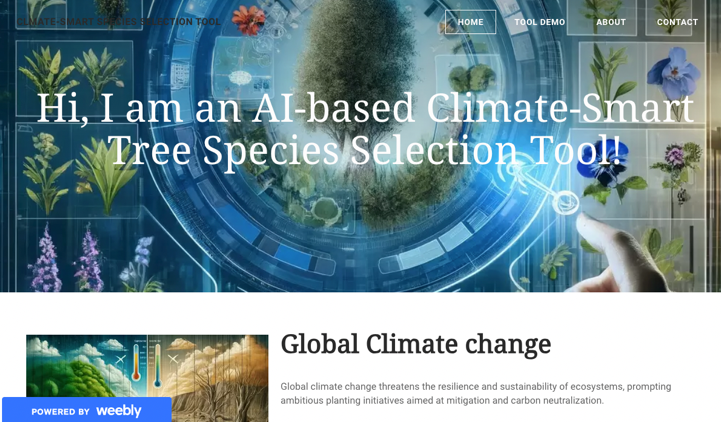The APFNet-funded project Asia-Pacific Forestry Adaptation to Climate Change(phase III), implemented by the University of British Columbia (UBC), Canada, has recently concluded. The project achieved significant progress in climate-smart afforestation by developing an innovative tree species selection model that combines climate modelling with regional site and species data. This provides a robust scientific basis for plantation planning and choosing the right tree species under changing climate conditions across the Asia-Pacific region.

Figure 1. The newly launched Climate-Smart Tree Species Selection Tool allows users to identify suitable species for specific locations under different future climate scenarios.
As the impacts of climate change intensify globally, selecting tree species adapted to future conditions has become increasingly crucial. Selecting the right tree species is key to achieving long-term forestry objectives. Resilient species also boost carbon storage and support sustainable forest management. By applying climate-smart afforestation tools that leverage AI, the long-term survival, healthy growth, and overall ecosystem resilience of plantations can be significantly enhanced.
Since 2011, APFNet and UBC Faculty of Forestry have collaborated on three phases of this project, investing a total of USD 1.78 million in climate-smart forestry. The project has produced several widely used tools and models, including ClimateAP (https://climateap.net), which delivers high-resolution climate data for the Asia-Pacific region; climate niche models, which predict how species ranges may shift under future climate conditions; and the FORECAST model, which evaluates climate change impacts on forest growth, mortality, and ecosystem functioning.
Building on the first two phases, the third phase - led by Dr. Wang Tongli, professor at UBC’s Faculty of Forestry, culminated in the release of an upgraded ClimateAP model and the new Climate-Smart Tree Species Selection Tool (https://climate-smart-tree-species-selection.weebly.com). This new tool uses AI to assess the suitability of 100 tree species across three time periods (2011–2040, 2041–2070, 2071–2100) and under low, medium, and high emissions scenarios. Field tests were run in several locations to verify the model and the results have been published in Climate Smart Agriculture (https://doi.org/10.1016/j.csag.2024.100019). Other published research papers from this project cover climate impacts on endangered conifers, adaptation strategies of more than 100 Asia-Pacific tree species, and a review of niche modeling methods in forest research.
The project completion meeting was successfully held at the University of British Columbia. Over 36 months of implementation, the project director, Dr. Wang Tongli introduced that the third phase upgraded the ClimateAP platform with the most recent IPCC climate data. It provided annual updates from 2020–2023 and switched from Google Maps to an ArcGIS-based interface to improve accessibility in China. Project results were widely shared through international conferences across China, North America, and Southeast Asia. Together, the upgraded ClimateAP, expanded climate niche models, and the new Climate-Smart Tree Species Selection Tool provide a stronger scientific foundation for resilient plantation planning, enhanced carbon storage, and sustainable forest management.
The project completion and consultancy meeting gathered the project team at the UBC’s Faculty of Forestry, together with invited experts from Canada’s academic and government forestry sectors. The two experts, Professor Andreas Hamann from the University of Alberta and Professor Elizabeth Campbell from the Canadian Forest Service--praised the project’s contributions to strengthening forest adaptation capacity in the Asia-Pacific region and advancing knowledge sharing. They also recommended next steps to include adding more climate variables and species traits to baseline data, developing a user-tracking system to monitor tool adoption.
Looking ahead, APFNet, in line with the next Strategic Plan and through the 4 pillars, will continue to advance climate adaptive and high-quality forests across the Asia Pacific region.
For more information about the project, please refer to:
Phase I:https://www.apfnet.cn/column295/column302/1648.html
Phase II: https://www.apfnet.cn/column295/column302/1103.html
Phase III: https://www.apfnet.cn/column295/column302/1128.html